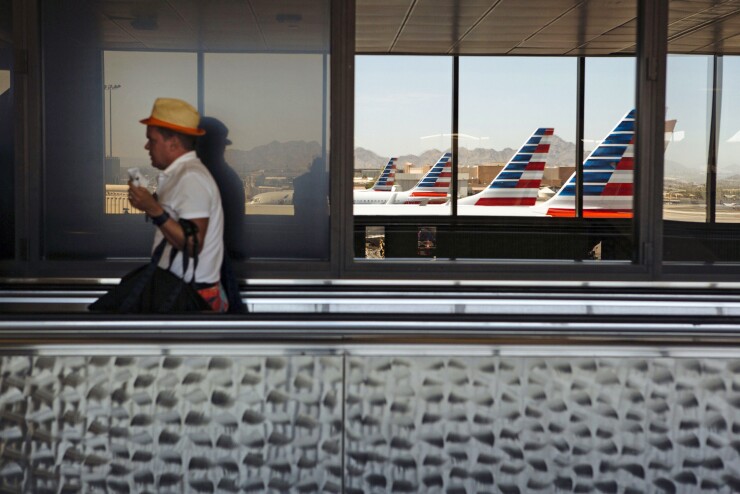Phoenix will add to a flood of airport debt with more than $1 billion of revenue bonds for major expansion projects.
The debt includes $313 million of revenue bonds backed by customer facilities charges on car rentals and $741 million for projects backed by general airport revenues.

Scheduled to price Wednesday bearing the name of the Phoenix Civic Improvement Corp., the junior-lien general airport revenue bonds will be offered in three tranches.
Tax-exempt Series A for $326 million is not subject to the alternative minimum tax and is rated A1 by Moody’s Investors Service and A-plus by S&P Global Ratings. The bonds, to be used primarily for the $740 million Stage 2 of the airport’s Sky Train transit system, reach final maturity in 2049. Sky Train connects the Valley’s regional light rail system to Sky Harbor Airport’s largest parking areas and two terminals.
Series B for $386 million carries the same final maturity date and ratings but is subject to the AMT. Proceeds will finance ongoing terminal expansion. A taxable Series C for $29.5 million will refund 2010 bonds with final maturity in 2025.
“All bonds benefit from fully cash funded debt service reserves funded to the lesser of maximum annual debt service, 10% of par, or 125% of average annual debt service,” Moody’s analyst Earl Heffintrayer wrote. “Starting with the sale of the Series 2017 bonds, bondholders agreed to consent amendments that removed existing prohibitions on leases with terms longer than 10 years.”
Citigroup is senior manager on this deal, led by director Neal Atterman. Co-managers are Cabrera Capital Markets, Mesirow Financial, RBC Capital Markets, and Siebert Cisneros Shank & Co.
Ken Cushine, principal at Frasca and Associates, is financial advisor.
The car rental facility bonds, to be priced through negotiation with senior manager Jefferies, are rated A2 by Moody’s and A by S&P.
The $235 million first tranche of customer facilities charge-backed car-rental bonds will go toward work on the Sky Train and is not subject to the AMT, while the $78.7 million tranche is taxable. Those bonds will refund a 2004 issue.
The ongoing Sky Train extension will bring the people-mover to the rental car facility, which was completed in 2006.
A recent Arizona Supreme Court ruling relating to rental car taxes in Maricopa County bodes well for a similar legal challenge to the city's charges at the airport, Heffintrayer said. After a lower court ruling invalidated the county's rental car tax to fund sports facilities, the city received notice that a similar challenge was going to be filed challenging the customer facilities charge.
Action on the CFC suit was paused pending the Arizona Supreme Court review of the tax case. In February 2019, the Arizona Supreme Court ruled the county's rental car tax constitutional. In October 2019, the U.S. Supreme Court chose not to review the case.
“The plaintiff has not notified the city of its planned actions on the CFC, which could include a motion to the Arizona Supreme Court to reconsider or an appeal to the U.S. Supreme Court,” Heffintrayer said. “Both seem unlikely and we view the risk to the CFC to be significantly lessened. In the event the case were to move forward and be successful for the plaintiff, Phoenix has negotiated a provision in its rental car agency agreements that provides for certain remedies intended to continue to support the rental car facility and protect bondholders.”
The Phoenix deals come as airports across the nation issue billions in revenue bonds, many subject to alternative minimum tax provisions for high-income taxpayers. Virtually every major connecting hub in the U.S. is in some stage of expansion.
Officials at Dallas-Fort Worth International Airport decided that all future issuances would be taxable rather than compete in the AMT market. DFW has aggressively marketed its bonds to international investors in anticipation of an upcoming series of issues for airport expansion.
Serving a steadily growing metro population of nearly 5 million, Sky Harbor ranks 14th among airports in originating passengers. American and Southwest Airlines accounted for 80% of enplaned passengers in the last fiscal year. From March 2015 to March 2019, originating passengers increased 19%, according to airport statistics.
During the same period, Sky Harbor revenues increased nearly 16% to $410.4 million.
The airport's long-term plan includes moving cargo and support operations to the north side of the airport to create room for expanded terminal facilities.
The bond-funded projects include the last component of the Terminal 3 modernization program, a renovated north concourse to open in 2020 featuring new shops and restaurants and customer amenities such as power outlets.
The 2.5-mile extension to Sky Train is expected to open in 2022.
Terminal 4, which over the past two years recently opened new shops, is also getting an upgrade with the addition of an eight-gate concourse. The eighth concourse, expected to open in 2022, will serve Southwest Airlines.
Sky Harbor’s debt backed by airport revenue at the end of fiscal year 2018 came to $1.5 billion. S&P expects the airport's total debt to rise to about $2.1 billion by fiscal 2023.





